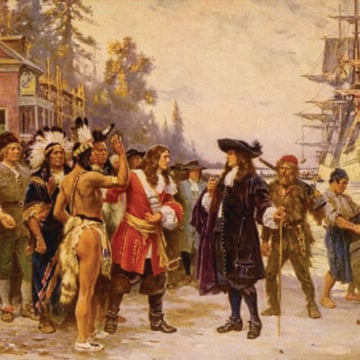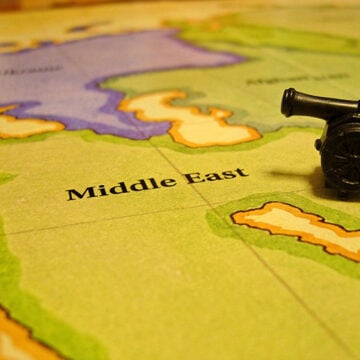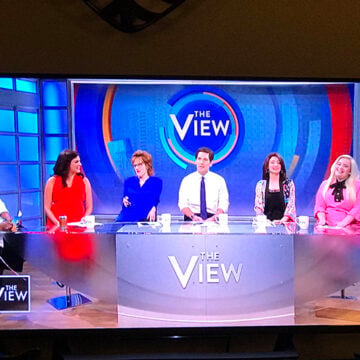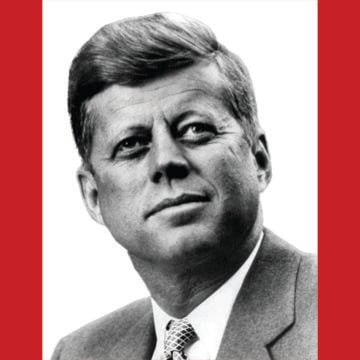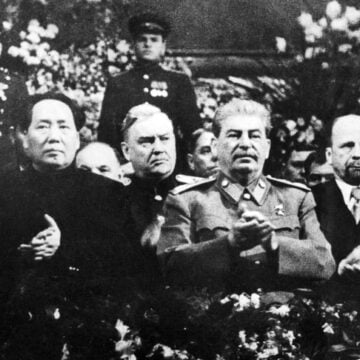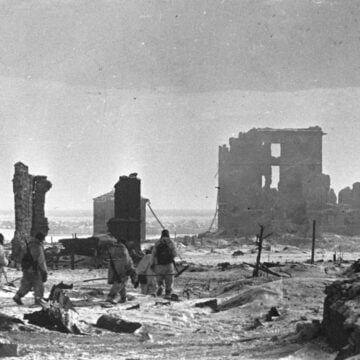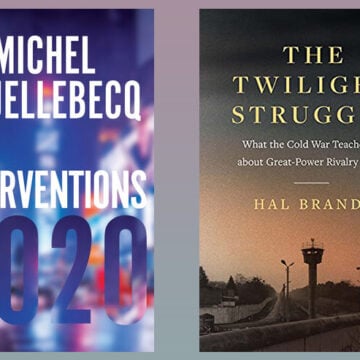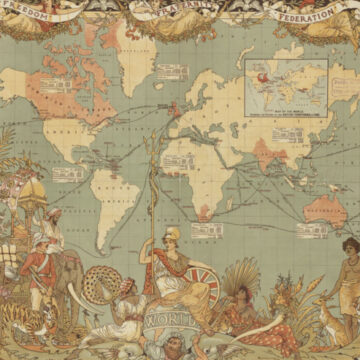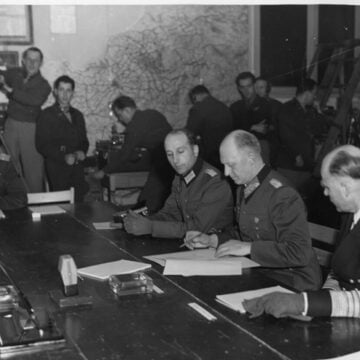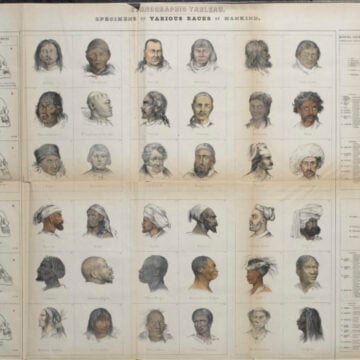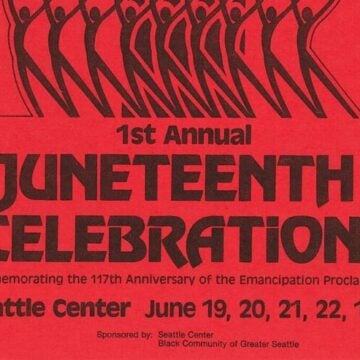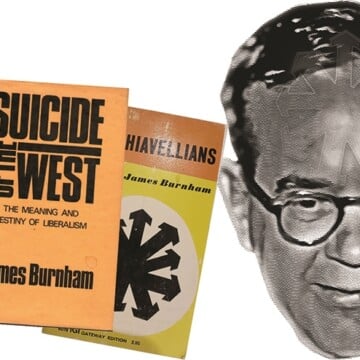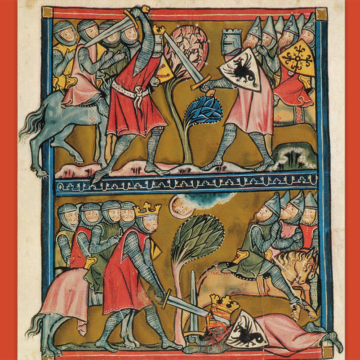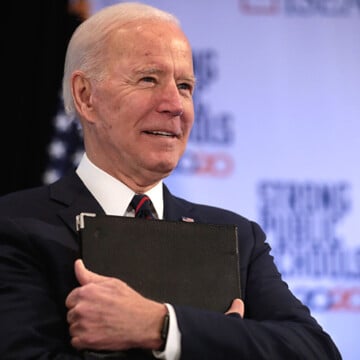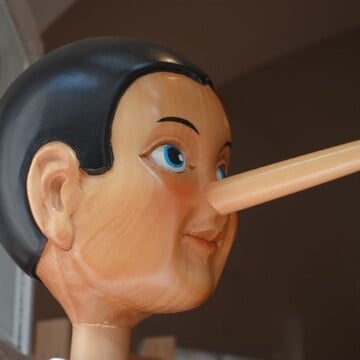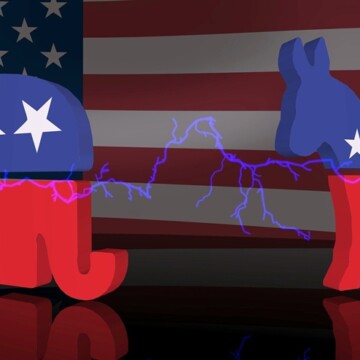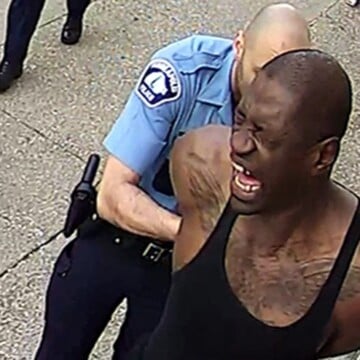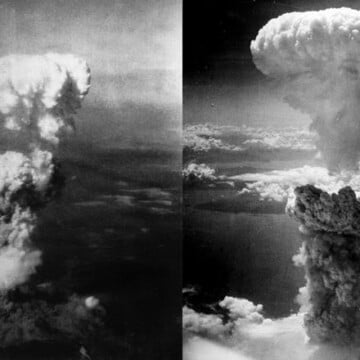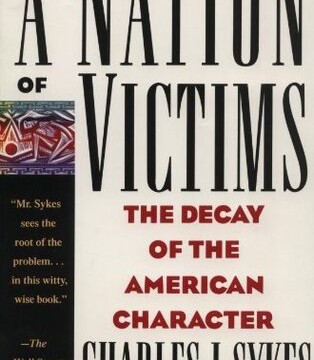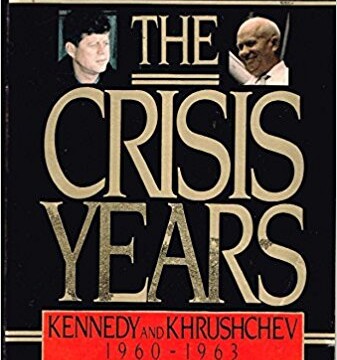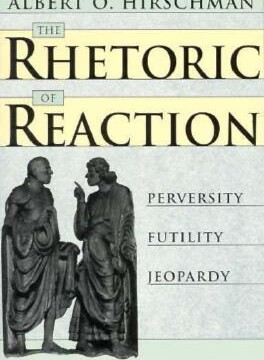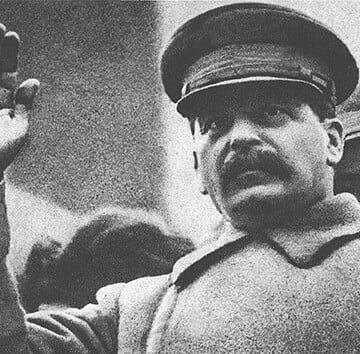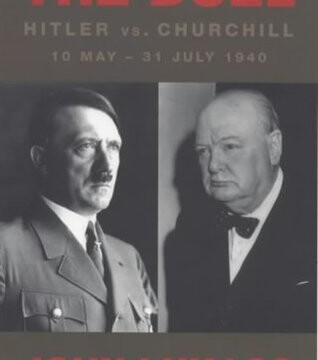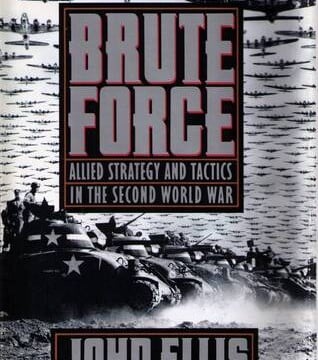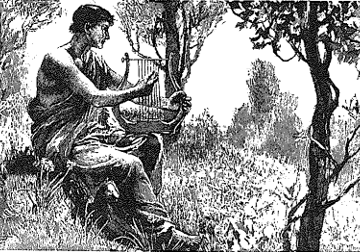'On Settler Colonialism' questions whether settler-colonial ideology is just the latest product of the demoralization of the Western world that has gone on since 1914 or whether it is an especially vicious and dangerous development.
Author: Alan J. Levine (Alan J. Levine)
Western ‘Colonialism,’ Israel, and Anti-Semitism
What really explains the repeated historical periods of hostility toward Israel and the Jews.
A Book That Needs No Sequel
Rachel Maddow plays up the danger of a reemergence of America’s 1930s and 1940s domestic fascist movements to an absurd extent.
Secrets of the Muddled East
The struggles of the Middle East cannot be summarized or dismissed in chalking it all up to the Palestinian-Israeli conflict. There’s much more at play in the region.
Killing Is Par for the Course in the Middle East
Given the amount and variety of killing in the Middle East from all parties, it is curious how the media fixates on the Israeli-Palestinian conflict, where casualties are comparatively low.
‘The View’ or ‘The Coven’?
A roundup of the woke oddities and mediocrities populating television’s most popular daytime talk show.
Charles Schumer: Jewish Bourbon
There is little excuse for Schumer’s shock, and his speech on anti-Semitism, delivered in his usual sanctimonious style, was unimpressive. It may have satisfied him. There is no reason it should satisfy anybody else.
John F. Kennedy Remembered Without Tears
Kennedy mythology will be on full display for the 60th anniversary of JFK's murder. Despite all the adulation, the real JFK was a man who can only be described with a four-letter word: Fake.
Muddling the Missile Crisis
The Abyss, a pop history treatment of the Cuban Missile Crisis, revives unhistorical myths in an effort to chalk the whole thing up to American hysteria, and to portray the bumbling JFK as having masterfully handled the crisis.
Empire’s Bloody End
In A Continent Erupts Ronald Spector analyzes the complex conflicts of East and Southeast Asia in the 10 years after the end of World War II.
World War II, Served Slightly Woke
In Blood and Ruins: The Last Imperial War, Richard Overy gives a comprehensive analysis of World War II, despite a tiresome woke influence on the topic of imperialism.
Books in Brief: April 2023
Short reviews of Interventions 2020, by Michel Houellebecq, and The Twilight Struggle: What the Cold War Teaches Us about Great Power Rivalry Today, by Hal Brands.
Beating a Dead Imperial Horse
In Legacy of Violence, Caroline Elkins projects her skewed view of 1950s Kenya onto the entire history of the British Empire.
Reassessing Unconditional Surrender
The Western insistence on the unconditional surrender of its military opponents has its roots in a World War II strategy that backfired, making peace more difficult to achieve.
Race Erased
Racism, Not Race starts from the assumption that biological races do not exist, rants leftward from there, and finishes by slapping the white-supremacist label on Trump voters.
A Problem with Creating Politically Correct Holidays
Juneteenth—or June 19—is not a good choice for celebrating the end of slavery.
Revisiting Suicide of the West
The philosopher and commentator James Burnham (1905-1987) was one of National Review’s founders and senior editors. Having broken with Trotskyism, he became one of those thinkers in the tradition of Edmund Burke and James Fitzjames Stephen, who, if not enthusiastic about modern democracy, were classic defenders of free institutions. He attained fame for his 1941...
The Critical Flaw in Critical Race Theory
Over the last 30 years, especially since the spring of 2020, Critical Race Theory (CRT) and its accompanying obsessions with “whiteness” and “white privilege” has almost overwhelmed discussion about race and racism in Western society. CRT “recognizes that racism is engrained in the fabric and system of the American society,” declares a definition from...
Myths About Cuba Persist on the Left and Right
Recent debates over what to do about Cuba remain afflicted by myths, many going back to the origins of the Castros’ Communist regime. There have generally been two conflicting accounts of how this regime was established and its relation to the Cuban past, and both may need to be corrected. Some of the most childish...
Biden at Tulsa Is a Study in Historical Confusion
In a rambling performance taking three-quarters of an hour, President Joe Biden spoke at Tulsa on the anniversary of the murderous events of 1921. He subjected his audience to his usual mangled sentences, omitting key words or parts of speech, sometimes to the point of total incomprehensibility. In fairness it should be noted that he is hardly...
The Decline of the Art of Lying
We live in an era of unprecedently widespread lying. Yet lying itself, is an art—albeit an unadmirable one—in decline in a decadent age. Our leaders have set a spectacularly bad example. Former President Trump lied continually and shamelessly, as do his noisiest enemies and his successor. But they are bad liars—clumsy, unconvincing, and incredibly short-sighted,...
The Moral and Intellectual Collapse of America’s Political Parties
It is no longer news that 2020 saw a collapse of political discourse and public behavior in the United States. Trends that developed over many years intensified last year. One major political party had as its candidate for president a magnetic figure who can also be nasty and lacking in verbal self-control. The other party...
The Left’s Delusions on Crime and Policing
The death of George Floyd and the reaction that followed have seen an explosion of hysterical accusations, breast-beating, and lying that is extreme even by the standards of the last half-century. It is no exaggeration to say that reason and common sense have largely fled the scene, and there has been an incredibly weak reaction to...
Dropping the Ball on the Bomb
Unraveling modern confusion about the decision to drop the atomic bomb. There is still a remarkable amount of confusion about one of the last acts of World War II: the use of the atomic bomb. The destruction of Hiroshima and Nagasaki was horrible, but not more so than many other episodes of the war. To keep...
Every Man a Victim
“Mankind is tired of liberty.” —Benito Mussolini An acquaintance of mine, who is not particularly conservative, once heard a television newsman quack about how bad the 1950’s were. Disgusted, he burst out, “What was wrong with the 1950’s? People were norma/then!” People certainly seem a lot less “normal” nowadays. Charles J. Sykes has written a...
The Dictator and the Scoundrel
To anyone old enough to recall the early 1960’s, the names Kennedy and Khrushchev will provoke a wealth of emotional associations far stronger than those evoked by the names of most later Presidents, or of the colorless characters who followed Khrushchev as rulers of the Soviet Union. Unfortunately, both men have been much misunderstood during...
Theses and Antitheses
American liberals have long been troubled by a sinister force lurking in our society, namely conservatism. Albert O. Hirschman’s motive in writing The Rhetoric of Reaction is to explain this phenomenon to his fellow liberals. He refrains from psychoanalyzing conservatism; instead, he argues that conservatives, regardless of personal quirks, are bound to certain forms of...
Studies in Tyranny
“Tyranny, like Hell, is not easily conquered.” —Thomas Paine Nearly half a century after their destruction, Nazi Germany and Adolf Hitler remain the objects of greater attention and hatred than do Stalin and his Soviet Union, although the extent of their crimes were similar and Stalin’s regime was in some ways the more complex and...
Visions and Revisions
“A morsel of genuine history is a thing so rare as to be always valuable.” —Thomas Jefferson In his latest book, John Lukacs returns to some of the same territory that he covered in one of his finest works, The Last European War. Here he has concentrated on the critical period in which the Nazis...
The Key to Victory
John Ellis, a well-known British military historian, has made a major contribution to our understanding of the nature of World War II with an unflattering reappraisal of the effectiveness and leadership of the Allied forces. His views are not always just, but he raises issues that, while not totally ignored, have usually been confronted only...
The Big Surprise
Charles Murray: Losing Ground: American Social Policy, 1950-1980; Basic Books; New York. Charles Murray’s book is a study of some of the biggest, and perhaps the least excusable, social problems facing American society. Losing Ground is based on a mass of data, and its message is clear and unmistakable: the benevolent social policies adopted in the 1960’s have...
Commendables – Last Rites
Mary Douglas: Purity and Danger: An Analysis of the Concepts of Pollution and Taboo; Ark/Routledge & Kegan Paul; London. The history of most religions can be written as a struggle between High and Low Church. There is always a tension between those who adhere to ritual and tradition and those who seek salvation only from...
Commendables – Schools for Scandal
Herbert I. London: Why Are They Lying to Our Children?; Stein and Day; New York. The title of Herbert London’s book is an all-too-accurate description of the textbooks used to “educate” American students, Why Are They Lying to Our Children? is a brief and closely reasoned exploration of the “faddist and trendy character of these books,...
Commendables – Mother of Her Country
Pauline Glen Winslow: I, Martha Adams; St. Martin; New York. Something strange is brewing in the popular arts these days. Red Dawn reminded its very large audiences of the possible menace of a Soviet invasion, and every week producer Stephen J. Cannell entertains millions of Ameri can viewers with the exploits of heroic Vietnam veterans...
Commendables – Troubled Sleep
Mary Wollstonecraft Shelley: Frankenstein: Or, the Modern Prometheus; University of California; Berkeley. In the more than 165 years since Mary Shelley wrote her Gothic tale, Victor Frankenstein and his monster have become an enduring symbol of the modern mind. She was only a girl of 18 when her adolescent nightmares curdled into the murky tale...
Bombs Away
John J. Mearsheimer: Conventional Deterrence; Cornell University Press; Ithaca, NY. Paul Bracken: The Command and Control of Nuclear Forces; Yale University Press; New Haven, CT. Two of the major problems facing Western defense and foreign policy are truly Siamese twins: that of deterring nuclear war, and the possibility of a conventional Soviet invasion of Europe. They...
Constructive Criticism — Sometimes
Sidney Hook: Marxism and Beyond; Rowman and Littlefield; Totowa, NJ. Sidney Hook’s latest book is largely a collection of previously printed articles and reviews; but it is nevertheless another interesting contribution to American intellectual life and a worthy companion to such works as Political Power and Personal Freedom. Hook remains an astute observer and an...
Twisting & Turning Totalitarianism
As the year in which George Orwell’s masterpiece was set approached, a wave of critics, eulogists, and scavengers emerged. 1984 is a work hard to attack directly, though that has been done, and some who profess to be praising Orwell’s work would really prefer to bury it. E. L. Doctorow, in a recent Playboy article, provides a...
Twinkle, Twinkle
These three works deal with aspects of what will be a crucial problem of the next generation: the exploitation of space travel and its effect on the arms race. Daniel Graham’s High Frontier advocates convincingly an all-out space effort for both military and economic purposes. James Canan’s book is a straight reportorial account of the...
